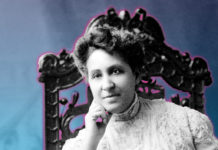This will carbon date me, but there is a famous piece of art created in 1986 called “Return To Camelot,” where an entire previous chapter of the story was upended when the audience discovers it was all the dream of the character Pam.
Thus was the opening Dallas’ ninth season when we learn that season eight never happened.
Millennials, Google it.
And, thus is the year 2016 in which the NAACP made news with an out-of-left-field resolution that aimed to stop charter school growth. After proposing the resolution, but before passing it, the historic multi-racial corporate-funded organization held hearings in several cities that were mostly an embarrassing sham. Board members often looked like bored members and some struggled to stay vertical and awake.
They delivered different messages in different cities, for instance, in Los Angeles board member Alice Huffman said the organization wasn’t a strike against charter schools per se, just bad ones; but in New Orleans she got caught up in the drama of the crowd and said she would shut down all charters if she could.
(Huffman leads California’s NAACP and has long fielded claims that she takes money from whatever group offers it in exchange for the NAACP’s stamp of approval on issues. Corporations like Coca-Colaand lobbyists from big pharma have been among those benefiting from the retail transactions, and when it came to charters it certainly looked like national teachers unions and their allies were calling in favors for their grant-funding of the NAACP).
The panic charter schools operators, parents, students, and funders experienced was aggravated by analysis that the NAACP was licensing its name and membership to the anti-charter unionists who would use it to blackwash ALEC-styled model legislation aimed at disabling charter schools across the country.
Many observers called for calm, noting the NAACP is organizationally weak making them strategically irrelevant in practice (even if nominally revered in theory), but I thought differently because it seemed to me the unions own the political Hemi, black organizations are just the hood.
A new piece from my friend Beth Hawkins at The 74 provides excellent detail on how the pay-to-play unionist acquisition of the NAACP’s good name failed to produce much other than applause from anti-charter Tweeters who are often white and in need of cover to rebuff blacks who support and participate in charters. The ability for them to say “I support the NAACP’s moratorium on charter schools,” as if that is their magical “I’m not racist” card, was really what the unions bought and paid for.
This from Beth’s piece:
A lockstep push, however, has failed to materialize. The group’s 2018 national convention, held in July, featured a single education workshop, led by the American Federation of Teachers; a screening of the controversial documentary A Backpack Full of Cash; and, with the exception of the chief activist behind the moratorium, California NAACP Education Chair Julian Vasquez Heilig, virtually no Twitter chatter.
Indeed, in an interview with Politico published a few days before this year’s convention, new NAACP president Derrick Johnson struck a conciliatory tone, saying the organization does not oppose charter schools but plans to keep the heat on concerning “a wide range of problems,” including the need for more oversight and transparency.
“There are some charter schools that have some really good best practices,” said Johnson. “Why shouldn’t those practices be implemented in a public school setting? There are some dog-awful public schools. How do I know? Because we try to sue them every chance we get. Our position is, a quality education should be afforded to all children.”
How did the issue go from red hot to tepid? Publicly, many education advocates say they won’t talk about the shift out of fear of reopening the debate. But privately, several say the change in tone underscores shallow support for the measure within the NAACP, as well as agreement that defending civil and voting rights protections in the Trump era is a much higher priority.
Several advocates who track state education policy point to vocal opposition to the resolution among allied groups such as the UNCF, a lack of support by local NAACP chapters, and quiet personal outreach by charter school leaders to NAACP officials at the grassroots level. Few of those local leaders, they say, are willing to work against schools opened by members of their own communities.
“They don’t have the ability to make the case,” said one of the advocates, who asked not to be named. “Especially when, at the local level, they will have to go up against other leaders of color.”
I’m not prepared to call the moratorium hoax a wash yet, or discount the possibility that behind the scenes the NAACP’s financial stage mothers are working up designs to pressure Democrats to push legislation that hobbles charters, but the fact that the national organization is striking a softer tone is good news.
They have also accepted money from school reform funders too, after all.
I’d love to see life imitate art and for this to be a Return To Camelot where Pam….ahem, Randi…wakes up from her dream only to find charter schools are still popular with black people regardless of what her colored grantees have told her.










